This inflation shock finally goosed the ECB out of its reckless NIRP policies.
By Wolf Richter for WOLF STREET.
This is what runaway inflation that kicked off in mid-2021, and was called “temporary” by the ECB at the time, looks like 14 months into it, as inflationary pressures are shifting from energy to other items and to services.
Inflation in the Eurozone jumped to 10.0% in September from 9.1% in August, a new record in the Eurozone data going back to 1997, according to preliminary data released today by Eurostat.
In Germany, where some of the government’s inflation subsidies expired, inflation spiked to 10.9% from 8.8% in August. Nine of the 19 Eurozone countries had inflation of 10% or more, including the three Baltic countries, at over 22%.
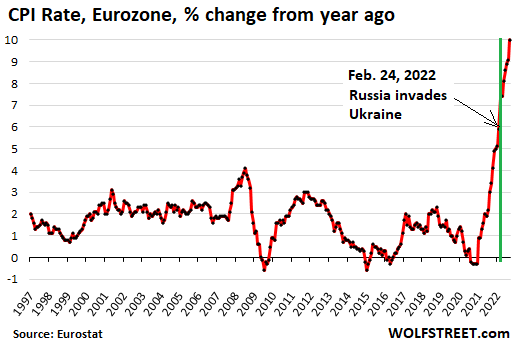
Inflation began spiking in mid-2021 – well before Russia’s invasion of Ukraine.
The fact that inflation began spiking in mid-2021, shooting past the ECB’s target of 2% in July 2021, and hitting 3% in August 2021, while the ECB called it “temporary,” shows that the same dynamics were at play as in the US: The inflation dam had broken, and suddenly inflation was washing over the land, and all inflation-heck was breaking loose.
Central banks, lulled to sleep by years of QE and interest rate repression that hadn’t caused much consumer price inflation – just asset price inflation – blew it off as “temporary.”
Then came the spike in costs of energy products and some other raw materials in 2022, making the already burning inflation scenario a whole lot worse.
Energy costs are still the big driver (+40.8%), but price spikes have spread across the economy to other goods, and even to services. Services inflation jumped to 4.3% in September, up from 3.8% in August.
Inflation without energy.
The CPI without energy spiked to 6.4% in the Eurozone, from 5.8% in the prior month. This measure hit the 2% mark in October last year and has spiked relentlessly since then:
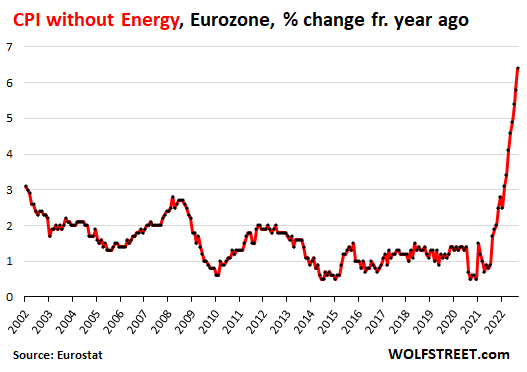
Inflation in Germany hits 10.9%.
Across the Eurozone, governments applied various strategies to push down the inflation rate, such as capping fuel prices, cutting fuel taxes, subsidizing fares for public transportation, etc., all of which kept the CPI lower. But some of those subsidies have expired, including in Germany.
In Germany, CPI already hit 6.0% in November 2021, well before Russia invaded Ukraine. By June 2022, the government cut fuel taxes and offered a public transportation subsidy in from of a €9-per-month transportation pass that allowed people unlimited travel on rail systems, buses, and trams across the country. This program, which contributed to a dip in CPI in June and July, ended in August. And in September, CPI inflation spiked to 10.9%.
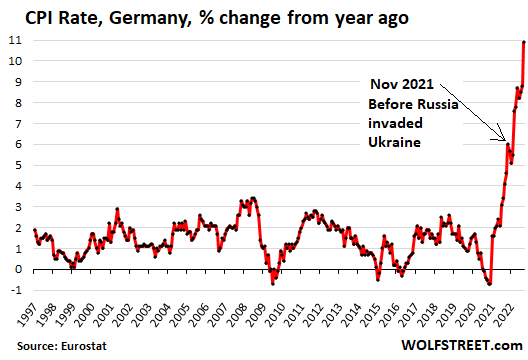
Russia’s invasion of Ukraine and the West efforts to halt Russia’s territorial ambitions in Europe caused energy prices to spike further. Russia’s invasion of Ukraine also tore directly into supply chains that ran through or originated in Ukraine, hitting Ukraine’s exports of iron, steel, cereals, animal feeds, electrical equipment, automotive components, etc., which triggered a series of shortages among European manufacturers, including automakers that were getting their wiring harnesses from manufacturers in Ukraine. All this contributed to price increases in Europe.
Runaway inflation, by Eurozone Country:
| CPI increase, September 2022 | |
| Estonia | 24.2% |
| Lithuania | 22.5% |
| Latvia | 22.4% |
| Netherlands | 17.1% |
| Slovakia | 13.6% |
| Greece | 12.1% |
| Belgium | 12.0% |
| Austria | 11.0% |
| Germany | 10.9% |
| Slovenia | 10.6% |
| Portugal | 9.8% |
| Italy | 9.5% |
| Spain | 9.3% |
| Cyprus | 9.0% |
| Luxembourg | 8.8% |
| Ireland | 8.6% |
| Finland | 8.4% |
| Malta | 7.3% |
| France | 6.2% |
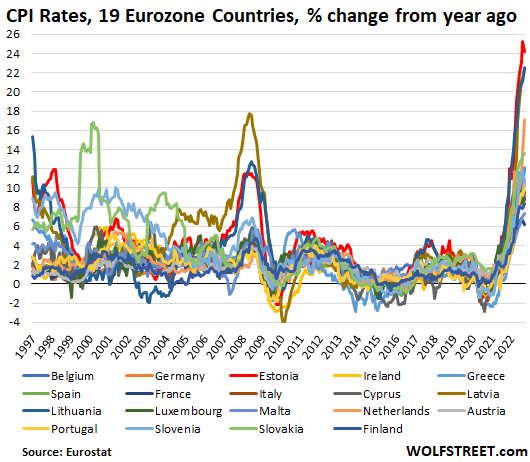
The ECB belatedly reacts to runaway inflation.
The ECB ended QE in June when its balance sheet topped out at €8.84 trillion in total assets. On September 8, it hiked its policy rates for the second time, this one by 75 basis points, bringing its deposit rate to +0.75%, which finally ended the era of Zero Interest Rate Policy (ZIRP), after its July rate hike had ended the crazy era of Negative Interest Rate Policy (NIRP). The absurdity now is that inflation is at 10% while the ECB’s main policy rate is at a ridiculous 0.75%:
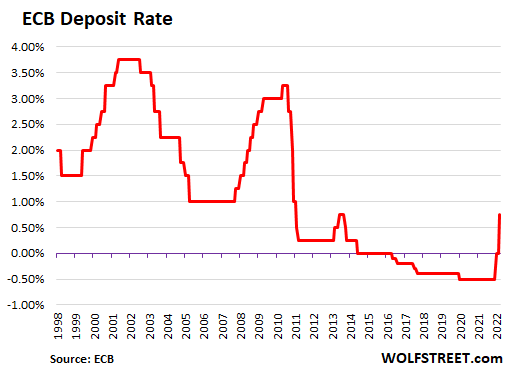
Enjoy reading WOLF STREET and want to support it? You can donate. I appreciate it immensely. Click on the mug to find out how:
![]()


“Inflation in the Eurozone jumped to 10.0% in September from 9.1% in August, a new record in the Eurozone data going back to 1997…”
Crazy!
I’m curious how this will impact German exports, with input costs accelerating so rapidly.
Oh, this is just the beginning. Just like UK, EU bonds and funds will also break before QT can even be started. Then ECB will be forced to restart QE and inflation will run way higher. Winter is coming!
EU is no better off than UK. The only thing that can save them is raises rates by 600 basis points today and they can’t do this because “The emperor has no clothes”.
Agree. When Euro goes to $0.50, the cup of coffee in Paris will be back to $5 (still overpriced by $3). You can also get raw ground beef on a plate for lunch. Saw it on TV.
I’ve had steak tartar in Brussels. I was hesitant but it was delicious! And it is basically raw hamburger with various spices and oils.
And it was expensive before inflation – not a cheap dish before.
It’s called “filet Américain” in the French-speaking part of Brussels – we lived there for three years — and it’s delicious. But it’s not “hamburger”; it’s ground tenderloin or similar.
Very high risk of beef tapeworm. Not advisable.
EU’s worse off. The Brits don’t have to worry about Greece or Italy or Spain or whomever defaulting.
QE got them into the mess they’re in today. They didn’t learn a thing about what ZIRP did to Japan the last 20 years… look at the shape Japan is in today.
Netherland inflation 17%,,,with intrestrate at 2%,,,,,are we seing the end of corrupted Fiat money now ??
IMHO this is not the end of fiat money (yet), but it may very well be the beginning of the end of the reserve currency status of euro.
There are alot of stocks sitting at support right now. The market is trying to decide whether we will have a Q4 santa rally (as often happens) or a continuation of the sell-off.
I think traders and small investors are buying the dip and think there will be a rally. I think the big fund managers still see a big fall coming and continue to raise cash levels with every rally.
Micron and Nike reported horrible news yesterday on earnings. Seems demand is just crumbling on many fronts. Even the new iPhones are projected to not sell that well.
My bet would be that all rallies will continue to get sold off, although a short term rally to start the new quarter could be coming. Definitely some end of quarter window dressing going on this week.
Next week will be very important. If stocks cant rally off this support, they will grind lower and lose support and plummet again.
I see that home sales in a couple areas I follow have absolutely tanked. No sales coming through now. Can you imagine being the family that put an offer on a home during july-august and now interest rates have accelerated up again and you are seeing that maybe you overpaid by 20% (near-term) and 40-50% long-term (they dont understand that yet, but they will see if unfold over the next two years).
It’s so bearish out there, everyone thinks there will be a rally.
Denial is a helluva drug. What would you want to believe — that things will get better, or worse? I should find out where these traders drink their optimism and frequent that bar.
There WILL BE a rally.
“Nothing goes to heck in a straight line.”
Maybe Monday. That’s my top pick. If not Monday, then Tuesday :-]
I don’t think anything more than a one or two day rally is in the cards. All we did was go back to June lows. A rally from here would be a bullish sign, and the smart money won’t put up with that for more than a day or two, when the Fed has a lot more work to do.
Nice call you two, Mon and Tues up big then kersplatt again.
@ gametv
Nasdaq 100 -~2.75%
S&P – -~2.5%
Dow – -~2.75%
And this is WITH the big rally on Wednesday… I too thought there’s be some buying to make the Q3 reports look better, but it seems not to be the case…
People are looking at their stock options and bonuses going quickly to zero. Even if you don’t work for Goldman or Tesla you’re probably thinking your normal $10k bonus will be cut to $5k or zero this year. At the margin that’s gonna affect people’s travel plans, xmas shopping, maybe house remodeling or buying… I don’t see any kind of relief unless the Fed has to move because something blows up. Which you also don’t want.
When is the ECB’s next expected likely rate-hike to take things from unbelievably impotent and behind to merely hillariously impotent and behind?
Those three countries in EU that have > 20% “official” inflation rate must be democracies in name only.
Such high inflation has to be called modern day slavery.
Estonia, Latvia, Lithuania with 25% inflation will be sacrificed by the ECB it seems. The ECB interest rate hikes are much too late, too little for these hyper inflationary countries. Most likely these EU countries will de-industrialize, de-populate over the next few years. There is nothing the ECB will be able to do. Surprisingly, the Netherlands are close to this scenario as well.
I was in Estonia last week. Prices were comparable to US prices. This may be due to the Euro/Dollar exchange rates.
The increase is, so far, mostly in gas/utilities. The price of goods hasn’t been increased yet. Takes time to work utility costs through the pricing chain.
ECB still buying the PIGS countries worthless Bonds,,,,,incredible
Does history repeat itself?
When there was high inflation, fascism and global conflict became a reaction.
These high inflations are getting everyone angry.
Fortunately, Europe has less capacity to spread its problems globally today. Though that doesn’t make dealing with the inflation any easier for the average European.
This time it was the other way around. Russian fascism and Putin’s conflict resulted in high inflation.
Read the article. Which part of “Inflation began spiking in mid-2021 – well before Russia’s invasion of Ukraine” do you not understand?
Highest inflation in Germany since at least 1951. Higher even than in the 1970s. Given the Weimar era hyperinflation – and resulting hyper-vigilance against inflation, including the strong mandates for price stability built into the ECB’s mandate – that’s stunning.
That 0.75% ECB deposit rate does nothing to encourage savers to put their hard-earned Euros into the bank- much better to buy now whatever they might need for the next 5 years, before the price goes up even more. Interest rates so far below inflation provide poor incentives that just make the inflation even worse…
Hey Wolf, I just came across this announcement by the Fed… What does this mean…. is it a normal thing? It was listed yesterday… I’ll post the link in a reply..
——————————-
Closed Board Meeting on October 3, 2022
Government in the Sunshine Meeting Notice
Advanced Notice of a Meeting under Expedited Procedures
It is anticipated that the closed meeting of the Board of Governors of the Federal Reserve System at 11:30 a.m. on Monday, October 3, 2022, will be held under expedited procedures, as set forth in section 261b.7 of the Board’s Rules Regarding Public Observation of Meetings, at the Board’s offices at 20th and C Streets, N.W., Washington, D.C. and by audio/video conference call. The following items of official Board business are tentatively scheduled to be considered at that meeting.
Meeting Date: Monday, October 3, 2022
Matter(s) to be Considered:
1.Review and determination by the Board of Governors of the advance and discount rates to be charged by the Federal Reserve Banks.
The meeting was announced three days ago. The rates they’re looking at don’t impact much at the moment since the facilities are barely used. In March, they had a similar meeting and decided to make some changes to the discount window terms (narrowing the spread and lengthening the term to 90 days). It seems they might discuss some other changes this time. I’m not going to lose sleep over it.
Blackrock blackmailed the BOE to buy bonds by threatening to leave the UK bond market altogether if they didn’t do it. Inflation is raging and yet there you go. The system is rigged. I expect the same here when something breaks. Good luck trying to trade this crap. As George Carlin said, it’s a club and you ain’t in it!
You gotta read beyond the headlines. The credit market was blowing up in the UK. BlackRock said it would execute on its collateral, which it had a right to do, which would have protected BlackRock but sunk the pensions. The pensions were idiotic getting into these LDIs at this scale, and so now there was a price to pay when they blew up. When you get into ZIRP, everyone starts taking huge risks. So now rates blew out in the UK, and the BoE gave everyone a little time to untangle those issues without panic selling of Gilts. It actually makes sense to me that they stepped in to calm down the credit market panic.
BTW, the 10-year Gilt yield is still at 4.14%! Not much effect of this “QE,” eh?
“The 10-year Gilt yield is still at 4.14%, BTW.” When inflation is raging at 10%. Its a sad joke.
Wolf, your reasoning is totally backward. This action of BoE is actually encouraging everyone to take more risks and not less. Rates are at 0% and inflation at 10%, what would anyone with half a brain do, spend and buy things. And BoE is reinforcing again that they will bail out if anything catastrophic happens. This is going on since 2008. If pensions wanted to de-risk their investments they should have done it in 2008 not now. They will never do it. This insanity started back in 2008 and they said at that time that its a one off QE and they will unwind within a few years. Haha here we are with even more QE when inflation is running at 10%. Wolf, you are too optimistic and naïve.
Blackrock probably encouraged the various Pension Funds to enter into these risky derivitive trades which are now blowing up. My guess, is that they were told they were based on models that had been tested and were essentially “risk free.”
Caveat emptor. I didn’t get a healthy balance sheet by believing everything any banker said. And I was not playing fiduciary with scads of other people’s money. But it comes back to a crowd, always — here the greedy pensioners. Mass demand is what is paralyzing the needed recovery.
I really appreciate wolf’s comments. It stops the comments section turning into zerohedge :)
But isnt the core problem with financial markets that they believe governments will step in and save financial actors in a crisis? Isnt that the whole reason the financial markets were able to run up so much higher than they should have?
It seems to me that moral hazard has been the primary problem of financial markets for a very long time, even going back to the great depression. Allowing markets to fully correct teaches people to engage in smart financial decisions only. It puts money into the hands of people with a good understanding of risk-reward ratios.
Just like a forest fire is necessary to start the next cycle of growth, it is necessary to let the financial house get burnt to the ground to teach people a lesson.
Of course, the other option is to put in place regulations that just stop large actors in the financial markets from taking bad risks. These pensions should have never been allowed to make those this type of bet. It reminds me of the volatility strategies from the past where investors were picking up pennies in front of a bulldozer betting on low volatility and then it blew up in their faces.
Excellent points, all of them!
+10000 gametv
Yes, this is a classic Minsky Moment (which actually takes ~2 years to play out from what I can see) and the central banks will be “assigning losses” through policy choices such as the one they just made.
First the central banks subverted the core message of Bagehot, and then after abusing the message in increasing doses, they took him out and shot him. Not unlike Keynes. Folks are always looking for an excuse to misbehave.
I understand what you are saying but once again, they took the risk, they should absorb the loss. Moral hazard is huge here. If you thought that the gov’t would bail out your losses but let you keep your profits, wouldn’t you also make stupid bets?
I’d love to know if these pension funds are going to take any losses as they reverse their positions or will they break even at the cost of tax payer money.
Fair point on the Gilt yield. The rise is still huge.
I’d say it’s a big effect, because Gilts were headed to 6-10%.
Gattopardo,
Yes, in terms of halting the panic — which was the purpose — it did that effectively.
In terms of QE, it did nothing. And from what the BoE said, that was also the intent.
The europeans kind of have to do LDI, as their stock market has gone nowhere in 24 years. (Euro Stoxx 50 +1.6% since 1998 inception.) This specifically isn’t as big a problem in the US, although I can think of other lurking leverage-related issues.
And when the BoE backs off of this “temporary” soothing round of QE, and their credit market panic promptly resumes, then what? Another “temporary” shot, and another, and another.
A quote by Freidman made famous by Reagan: “Nothing is so permanent as a temporary government program.” Like them or not, the quote is undeniably correct, and QE is the mother of all temporary government programs.
The FT reports on 30 September:
UK pension schemes are dumping stocks and bonds to raise cash and seeking bailouts from their corporate backers as the crisis in the industry rages on a week after the government’s “mini” Budget.
Most of the UK’s 5,200 defined benefit schemes use derivatives to hedge against moves in interest rates and inflation, which require cash collateral to be added depending on market moves.
The sharp fall in the price of 30-year government bonds, triggered by last week’s tax cut announcement, led to unprecedented margin calls, or demands for more cash.
To raise the funds, pension funds sold assets — including government bonds, or gilts — causing prices to fall further. The Bank of England stepped in to buy gilts on Wednesday, stabilising the market, but the pension funds are continuing to sell assets to meet cash calls.
And now several are naked, no longer hedged, fully exposed to rate and inflation risks:
While some schemes continue to rush to raise cash to fund their derivatives positions, others have had the positions terminated by LDI managers, including BlackRock, leaving them exposed to further moves in rates and inflation.
Natalie Winterfrost, a professional trustee with Law Debenture, said: “There are definitely schemes that were forced out of the game. There are a material number of schemes that will have ended up unprotected, with many more fully unhedged. If gilt yields fall further then their funding positions will deteriorate.”
Simeon Willis, partner at XPS Pensions Group, said: “There could be many hundreds of schemes that have had their hedges reduced or removed. This means their funding positions are now much more vulnerable than they were a week ago.”
The German government now wants to spend € 200 B to lower energy prices for citizens and companies.
We will see how fast or how slow this will be implemented.
Utility costs to the consumer are up 40%. Those costs will go higher, and winter is just around the corner.
When all you can afford is heat and food demand for all other goods stops. Jobs are lost and a deep recession/depression is next up.
I heard similar from a Italian blogger who has a small business in Italy, the electricty that’s powered by natural gas went up 400+%, and the government helps them pay 1/3… still 2/3 which is lots the business has to pay and their are taking negative profits. EU industries are moving operations to Asia, and their capitals are fleeing to nest in America. EU’s future is dim to me, soon they won’t be able to afford the high walfare system.
Subsidized energy, isn’t that an”emerging markets” type policy? “Emerging” in the sense of, always in an emergency.
Too much government spending and zirp causes economic activity (temporarily). Now savers in Europe get minus 10% real rate. Never trust anyone that can print money.
“CPI without energy spiked to 6.4% in the Eurozon”
There’s no such thing as CPI without energy, not entirely anyway. Higher energy costs mean it’s more expensive to run a factory and a supply chain, which shows up in product pricing. More expensive to run farm equipment and buy fertilizer, which makes food more expensive. If it’s more expensive for a repair man to get around or a construction company to build something, that’s going to show up in service inflation.
We can talk about CPI vs. PCE or some such nonsense all we want. That might still provide good information to paint the overall picture, but it’s impossible to fully divorce energy costs from overall inflation. Inflation may have been a thing prior to this whole Ukraine debacle, especially as pre-invasion product inflation has turned into post-invasion service inflation, but the higher energy costs have thrown a lot of fuel on the fire.
Thank you
Not Sure,
No one is “divorcing” energy from CPI. What kind of braindead BS are you fabricating??? RTGDFA
I gave you overall CPI 10% plus CPI without energy 6.4% plus services CPI 4.3% so that you can look beyond the immediate costs of energy, such as gasoline and natural gas and electricity for households, DUH. Services are only to very small extent impacted by energy, and they’re the majority of the economy. What’s your problem???
The broken dam followed by a “flood” starting to look like a pretty good analogy!
Will gold finally jump up and take notice?
“Will gold finally jump up and take notice?”
Not as long as the LBMA and the bullion banks can generate and sell contracts for future delivery.
“February 28, Bloomberg reported on a study co-authored by New York University Stern School of Business Professor Rosa Abrantes-Metz and Albert Metz, a managing director at the rating agency Moody’s Investors Service. In their not yet published draft research paper, the two authors claim that “The structure of the benchmark is certainly conducive to collusion and manipulation, and the empirical data are consistent with price artificiality” and that “It is likely that co-operation between participants may be occurring”. “
To which they replied: “We have come to the conclusion that their findings could be explained and are not a valid proof of manipulation of the pm London gold fixing.”
“They” = the LBMA
If gold was as underpriced as the “metal bugs” claim, there should not be now and or have been a single ounce to be bought since this claim was first made.
That nothing of the sort has even remotely happened demonstrates one thing and one thing only, the “metal bug” is irrelevant as a buyer of last resort.
Forget about USD or any other fiat currency. Look at the relative price of gold versus the tangible goods people need to buy.
It isn’t underpriced versus the past.
Exactly right. They can create paper gold out of thin air and sell thousands and thousands of ounces which do not in fact exist.
You’re assuming most buyers of “paper gold” want the physical metal when they don’t.
If they did, they would (try) to buy it.
If what you wrote is true, the price never would have risen from $680 in October 2008 to $1900 in 2011 or 2012.
Of course the buyers of paper gold don’t want the physical. Why lug around all those heavy bars when you can just “print up a lot of paper” and shuffle it around for nearly the same price as the metal and make a lot of easy money.
Gold? Come on. The only people who care about gold are the old geezers watching “Gold Rush” on Discovery. Lol, I must admit that I am one of them!
I finally got around to reading Capital in the 21st Century by Thomas Pikkety, and, well — inflating away public debt seems pretty popular after WWII. I suspect that factor is at play but got out of control because This Time Is Different.
I don’t know, just realizing that government isn’t there to look out for the people’s interests. Duh, some of you might say. I need to do more reading.
Inflation in the Netherlands at over 17% seems crazy to me. Netherlands is supposed to be an advanced country. Several major corporations have distribution and headquarters operations in Netherlands. Also, given the tax incentives in Netherlands, many companies are trying to report profits there. Any global companies operating there could have bad earnings ahead due to exchange rate issues.
I wonder why inflation in Netherlands is so high relative to other major countries in Europe.
Energy +114% v.s. sept. 2021.
Looks like they are going the route of price caps
and 18 billion euros in subsidies to keep their heads.
If you want to see a stock that has been truly amazing is AutoZone. AZO.
It looks recession proof, Covid proof, QT proof. It is up 200% from pre-covid too.
If you look at the monthly candle, it is pretty much at ATHs. Now way they grew sales by 200% but AZO is show the power of stock buybacks. This is a company that sales grows about 6 to 7% YOY but the stock goes up 50% to 100% YOY
I’m not really understanding why no one is talking about the Nordstream pipelines’ sabotage. Yes, at the moment, they weren’t open for business. However, with the coming cold winter and the fact that many big businesses in Germany were saying they had to close down – temporarily and some suggesting the closings would be permanent – which would affect the German economy in a big way – why this hasn’t affected the markets? As I understand it, all our economies are intertwined.
Human suffering aside, if German industry can’t produce and Germany goes into a deep recession, isn’t this going to affect the world economy? Germany is a big player. Whether or not the natural gas pipelines were currently in action but shut off, doesn’t mean they couldn’t have been re-opened in an emergency or a change of policy in Germany. Now that option is closed to the Germans. Just wondering why this isn’t a big deal.
Here are some answers for you. Check out the part about LNG and floating storage and regasification units (FSRU):
https://wolfstreet.com/2022/09/12/natural-gas-futures-plunge-44-from-peak-in-europe/
This article is from three weeks ago. Natural gas futures have ticked down further since then, now at €188
Thanks for the link, Wolf. I find it amazing that an economy as big as Germany’s can be propped up by energy exports without the infrastructure and a history of energy imports already in place. We are expecting to export natural gas to Europe from Australia but I’m assuming these amounts have been previously committed to customers abroad. I also assumed the U.S., while willing to export to Europe, will need a lot of that natural gas for its own people. I don’t really understand how natural gas futures aren’t positively affected by a bigger demand from Germany. I don’t expect you to respond – just thinking out loud and trying to make sense of all of this.
I agree with you, it was a mistake for Germany to put its eggs all in one basket with the Nordstream pipelines. But cheap is seductive, I guess.
Its a big deal. This is not the site for war coverage.
There are industry associations that you can follow in Germany.
And yes, they are in deep trouble.
Tom 15: I understand this isn’t the site for war coverage. Just wondering how it might affect the European economies, particularly Germany’s and if there might be blowback to other economies.
Inflation is at 17.1% in my Netherlands while people on a fixed income will be (finally!) getting an additional 7.5% in the next two years.
Inflation really is a tax on the poor.
You’re missing Sweden and Norway. Sweden is 9.8% for August.
No I’m not missing them. Neither Sweden nor Norway is in the EUROZONE. They have their own currencies (not the euro) and their own monetary policies.
As the title and everything in the article says, this was strictly about the 19 countries in the Eurozone — the countries that use the euro.